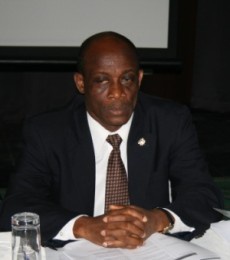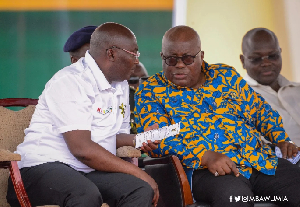How to generate growth that creates jobs without impairing the stability of the economy will weigh heavily on the choices government has to make as Finance Minister Seth Terkper unveils President John Mahama’s first budget and economic policy statement to parliament today.
In 2012 Ghana’s economy sailed into familiar yet turbulent waters with a blown-out fiscal deficit, a sharply-depreciating currency, and rising debt levels amid concern that the oil-fuelled strong economic growth rates were not providing enough jobs. Mr. Terkper’s budget is expected to address these problems.
“The budget is expected to focus on the continuous stabilisation of the economy, infrastructure development and accelerated growth to sustain confidence in the future of the Ghanaian economy,” said a statement from the Finance Ministry issued on Sunday. “It will also detail the achievements in 2012 and government’s economic policies for the medium-term,” the statement added.
Mr. Terkper, whose budget speech will be delivered against the backdrop of warnings by international ratings, agencies to downgrade Ghana’s sovereign deficit of 12.1 percent of GDP last year, hinted to the Business &Financial Times in an interview that government will narrow the gap even as it pursues a high-growth agenda.
According to Dr. Joseph Abbey, Executive Director of the Centre for Policy Analysis (CEPA), there is room to cut the deficit by half as some of the special conditions that caused the blow-out in 2012 are not present this year.
“We would like to see the budget deficit come down rather sharply. We think we should be able to cut it by half. This is double and will show the international community our commitment to get out of this situation.”
He said government must bolster the Ghana Revenue Authority (GRA)’s capacity to collect more revenues and control spending by completing and publishing the results of the public-sector payroll audit begun last year, which the International Monitory Fund (IMF) said could save the public purse some GHC100 million every month.
The Bank of Ghana (BoG) said last month that excessive growth in the public-sector wage bill due to the clearance of salary arrears dating back to 2010 accounted largely for the increase in deficit. In 2012 spending on government wages swallowed 47 percent of total revenues and grants. Fuel subsidies, the other main cause of excess borrowing, were cut substantially in February as part of early steps to tackle the deficit.
Mr. Terkper told the B&FT his budget will stick to President Mahama’s promise of at least 8 percent annual GDP growth during his term, and Dr. Abbey said growth is likely to pick up to between 8.3 – 8.4 percent on the back of a strong recovery in the oil sector – with output from the Jubilee Field expected to hit 120,000 barrels per this month.
The CEPA boss said however that the key issue at this moment is how to get the economy to create jobs. “What is important is that it is not just the growth, but how to get jobs. We have seen some growth spurts that did not necessarily create jobs.”
Head of Databank Research Samson Akligor said the economy is like to expand at between 7-8.5 percent, but cautioned that power crisis could pose a problem to industry competitiveness and constrain growth. The budget must make a decisive statement on how government intends to fix the energy problem as it is among the top concerns of industries, said Dr. Abbey, who worried that the current uncertainty in the energy sector is not conducive to planning.
Last year, the biggest threat to business’s plans was the sustained, steep fall in the value of the cedi – as much as 17.5 percent depreciation against the dollar – which caused input costs of industries to rise.
Dr. Abbey said government must learn lessons from the cedi’s travails by encouraging domestic production of the inputs that industries presently import for production, and not just pursue the short-term fix of lower import tariffs.
Business News of Tuesday, 5 March 2013
Source: B&FT
2013 budget: stability, growth on agenda

















